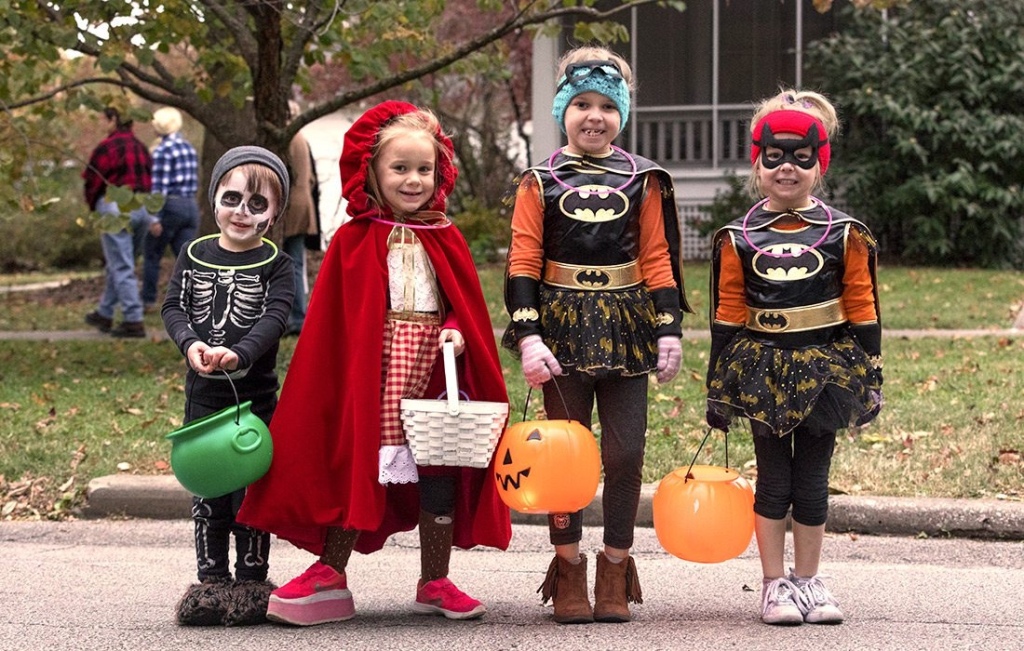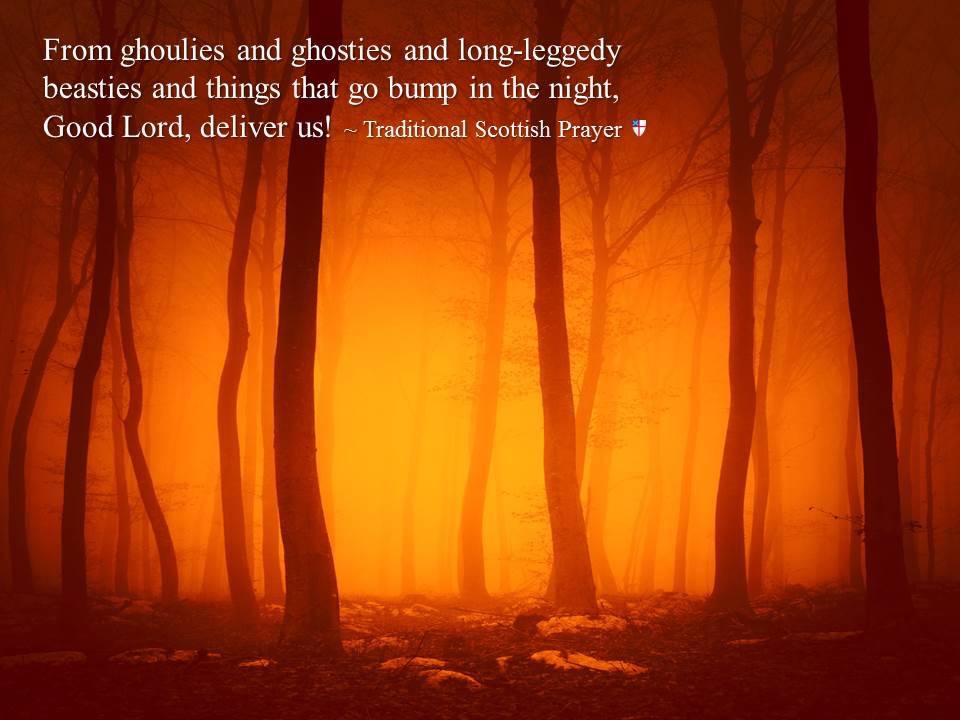On Halloween, All Saints, and the ghosts of the past (All Saints Year C)

My sermon for All Saints Day and Halloween, preached at Tuggeranong Uniting Church on 6 November 2022.
*****
Halloween seems to be a thing that has crept up on Australia more recently. Halloween trick or treating was not something I did as a child, nor was it even considered. But many Australian kids seem to have taken to Halloween including my grandchildren, and roam the street in spooky costumes in search of sugary and chocolatey treats. What they would do as a trick if they were refused is an interesting thought, and I am not sure they have worked that out yet.

We also seem to be having the Halloween equivalent of Christmas lights in streets around us, with house fronts covered in spiderwebs and large spiders, ghouls, witches and ghosts in front yards. My daughter even had three graves in hers.
But what is Halloween really? Is it dancing with the devil? A celebration of something sinister? An import from American culture we don’t need? Or is it imaginative good fun and giving kids a chance to be creative and neighbourhoods to come together and neighbours get to know each other? Is it representing the choosing of life over death, hope over despair, and good over evil?
Wikipedia informs us that Halloween (also known as All Hallows’ Eve, or All Saints’ Eve) is a “celebration observed in many countries on 31 October, the eve of the Western Christian feast of All Hallows’ Day. It begins the observance of Allhallowtide, the time in the liturgical year dedicated to remembering the dead, including saints (hallows), martyrs, and all the departed.”
Some scholars believe that Halloween traditions grew out of Celtic harvest festivals, particularly the Gaelic festival Samhain, which is believed to have pagan roots. Some go further and suggest that Samhain may have been Christianized as All Hallow’s Day, along with its eve, by the early Church in the same way Christmas was.

Other academics believe Halloween began solely as a Christian holiday, being the vigil of All Hallow’s Day. Celebrated in Ireland and Scotland for centuries, Irish and Scottish immigrants took many Halloween customs to North America in the 19th century, and then through American influence Halloween had spread to other countries by the late 20th and early 21st century.
Despite the ghoulies and ghosties and long-legged beasties that may have roamed the drier streets of Canberra last Monday, Halloween and All Saints Day are predominantly Christian festivals, still celebrated as such in many parts of the world. Since the time of the early Church, the feast of All Hallows began the night before, as did the feast of Christmas. These days are collectively called Allhallowtide and are a time when Western Christians honour all saints and pray for departed souls.
It is easy to talk about All Saints Day, but not so easy to get a sermon from Halloween. Yet that is where I am heading. I read a really interesting article in The Conversation on the topic of Halloween. By Alasdair Macintyre, it is on the topic of ‘hauntology’, a study of the memories and dreams that follow us through life. Macintyre writes, hauntology “is that eerie zone where time collapses and our past memories and associations haunt our minds, like a ghost”.
This philosophical concept of “hauntology” was invented by the French philosopher Jacques Derrida for his 1993 lecture Spectres of Marx. Apparently the words “hauntology” and “ontology” both sound identical when spoken in French, something which tickled Derrida’s fancy. Ontology is the philosophical and theological study of existence and being, dating back as far as ancient Greece and important in Christian theology, especially in regard to the Trinity. But in Derrida’s mind, the concept of ontology was shadowed by hauntology, a state of non-being.

I have been thinking the modern day church just might be stuck in hauntology, both haunted by memories of its past practices and by visions of the future that did not eventuate. Nobody 30-40 years ago foresaw that the church would be dwindling and aging. And John and I have found, when you talk to small churches as a Presbytery minister, they are haunted by memories of Sunday school numbers form 1950s and 60s.
It’s an interesting idea, this one of hauntology. The church is not in the place it planned to be 30 years ago. It hasn’t evolved in the way that people thought it would. Not everything that was planned was executed into action. Are these unfulfilled hopes haunting us now as a church?
Apparently such hauntings by unfulfilled expectations is a thing and has been studied. English theorist and academic Dr. Mark Fisher called this concept “cancelled futures” and associated it with a lack of action and cultural stagnation. He believed very little that was innovative was happening in our culture and there was instead an endless repetition and recycling of old ideas, just now in high definition and on social media.
He wasn’t referring to technology (which is advancing) but to the collapse of hopes that politically, economically and socially, the world might be improved.the regular and often startling upheavals of the 1960s have disappeared to be slowly replaced by a culture which struggles to imagine truly the possibility of a better future. Instead, such cultural upheavals and flights of imagination have been replaced by advances in mobile communication technology that have intensified superficiality and isolation rather than brought people together in healthy ways. Community, relationship, logic, and compassion are seen as frighteningly diminished and being replaced by social networking, short-term thinking, individualism and fake news.
To put it another way, being haunted by memories and nostalgia from the past along with unrealised hauntings of unfulfilled dreams has led to a crisis of imagination on our present times. For example, society as a whole has failed in formulating new ways of living in the face of a looming climate disaster. We largely continue with business as usual, though expressing concern over the potential consequences.

This apathy or fear or inertia or whatever it is will not help us as the climate warms and things worsen. We are creating more ghosts with loss of habitat, loss of species, loss of faith in something. So what needs to be done? How are we to deal with unfulfilled hopes still being all around us, albeit unseen? Whether you believe in ghosts or not, people, traditions and events from decades past continue to appear and influence our minds and our behaviour.
Firstly, we need to rethink our relationship to the past. We can’t stay trapped in it or use it to develop excuses for not addressing the needs of the future. And we can’t just be critical of things such as non-action by governments on climate change. We need to do some re-imagining of what is needed and move beyond critique to alternative modes of living and being – from hauntology to ontology if you like.
Next, we need the skills to deconstruct the memories and stories we have created that no longer serve us well and make new ones. Jesus was a master at this. Derrida saw Jesus as the “greatest” and “most incomprehensible of ghosts.” He saw Jesus as having spectral and life-exceeding attributes. Why?
I assume it is because Jesus challenged the comfortable institutions of his day with a radical reinterpretation of the narrative of their inheritance and tradition. Refusing to be haunted by the ghosts of comfortable living in the knowledge the Jews were the chosen people, Jesus recast and reframed the narrative of justice and righteousness for his context. “Blessed are you who are poor … who are hungry now … who week now … you will laugh, you will be filled, yours is the kingdom of God” (Luke 6:20–21).
Jesus reimagined a future of equity and justice in the vision of the kingdom of God. “I say to you that listen, ‘Love your enemies, do good to those who hate you, bless those who curse you, pray for those who abuse you” (Luke 6:27–28).

He inspired followers who caught the vision and ran with it through the Roman empire and beyond. He started a movement that would lead people to transform lives and live in ways that supported fairness, acceptance and justice for everyone. “Do to others as you would have them do to you”, he instructs his followers ( Luke 6:31).
Jesus was present to his community through relationships and story, focused on being in an ontological sense rather than yearning for the ghosts of hauntology.
What has happened to this movement? What has happened to this story that lives in churches’ past and traditions but seems to have lost its transforming power and its bite? What is the story of the future that church should be telling? How do we reframe the story of the future in the face of instability, uncertainty and failed futures? Can we escape the “eerie zone where time collapses and our past memories and associations haunt our minds, like a ghost?”
Instead of being haunted by things already done or by wistful thinking on unfulfilled futures, we need to listen to Jesus, the messiah who brought in new ways of perceiving life and faith and “who haunts our self-presence, our self-sufficiency, who disturbs the order of the same, who comes to us as the voice of the dead to whom we bear a responsibility, and as the voice of the one still to come.” (John D. Caputo 1997).
Jesus, as a messianic figure, holds “open the door” of the would-be closed system of empire. He disrupts the legacy of his heritage. He takes a stand with everyone and everything that has been rejected or expelled by heritage and empire, all that are disempowered by these powers, and demands a revisioned future of fairness.
The church, like Jesus, needs to haunt people and society in meaningful ways. Things do not evolve, thrive or disappear in isolation. Something or someone is creating the conditions to allow such things. It is only by transforming our narrative, our lifestyles, our faith stories that the church bring about the radical social change that Jesus was committed to.
It is only by transforming what we have that we can effectively alter what is bad and what is destructive in our lives and our communities. The ghouls and ghosts of uncritical thinking, fake news, war, patriarchy, racism, individualism, unbridled climate change and non-acceptance of the other have no place in our community, and we as the church are called by Jesus to do nothing less.
Prof. Rosalyn Diprose, from the UNSW, states that “In the extraordinary responsibility of inheriting the future-to-come, it is all of this that we must continue to interrupt, transform, and put at risk.” (2006, 446)
As a church, must develop this new narrative, this story of hope, metanoia and courage. We must take risks for the gospel, and not allow the ghosts of the past or the unfulfilled future to rob us of these things. And we must continue to pray, From such ghoulies and ghosties / and long-leggéd beasties / and things that go bump in the night, / Good Lord, deliver us. Amen.

No comments:
Post a Comment